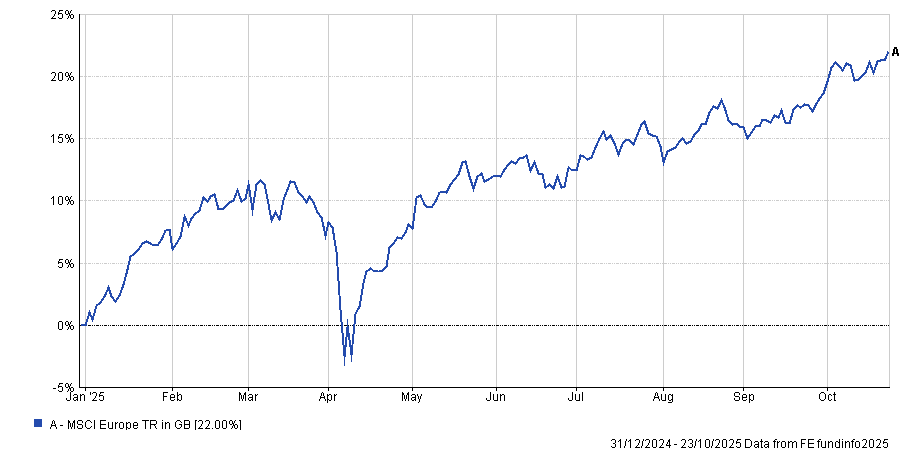Every asset class and region offers both reasons to buy and reasons to sell right now, with bullish and bearish views pulling investors in opposite directions.
Europe has been no exception. Optimism earlier this year was supported by Germany’s expansive fiscal stance, greater defence spending and investment in renewable energy; more recently, however, political uncertainty in France, weak earnings and rising valuations have reignited caution.
Several large managers, including BlackRock, are still positive on the region but struck a more cautious tone, while others such as Neuberger Berman outright believe Europe has already had its moment in this sun.
Taking the opposing view, JPMorgan Asset Management head of multi-asset strategy John Bilton said he was “very enthusiastic” about the region’s prospects in both the short and long term – highlighting three key points that made him more comfortable with the region.
Performance index over the year to date
Source: FE Analytics
The first was the household savings rate of 15.7%, which is the highest it has been outside of the pandemic years.
“The average over the past 25 years is around 13.5%, so European households are already saving more than they need to,” he noted.
Secondly, Bilton is expecting a flow of earnings upgrades in 2026 on the back of greater liquidity across the euro area.
“We are seeing massive money-supply growth and we know that props up the Purchasing Managers' index (PMI), which itself leads to upwards earnings revisions,” he said.
“The explosion we’ve seen in liquidity and the very positive credit impulse point to upgrades coming for European earnings as we move into calendar year 2026.”
He also viewed the widespread scepticism around Europe as a positive sign in itself. Despite fiscal tailwinds and improving data, many investors still dismiss the region, which for Bilton created a classic contrarian setup.
“People still say ‘Europe, really?’, but I’d far rather look at an opportunity like that because I can see positive catalysts,” he said.
One such catalyst is the NextGenerationEU fund, the stimulus package designed to boost the European economy (among other goals). With a lot of capital to deploy, around a third of the allocated funds remain unspent at present, he said.
“There’s a lot to look forward to for Europe, and I still think that with people writing the region off, it’s an interesting opportunity.”
That said, Bilton acknowledged that European politics can be distracting for investors, with “a lot of political machination in front of our eyes”. But once investors get used to that and look through it, it’s “surprising how well Europe operates despite all the detail we perhaps don’t really want to see”.
While his focus was on the near-term data and cyclical opportunity, Karen Ward, chief market strategist for EMEA at JPMorgan Asset Management, viewed Europe’s appeal as increasingly structural.
“Our long-term optimism about Europe has been growing since the pandemic. Europe is best in a crisis and when it’s got a common adversary. President [Vladimir] Putin’s invasion of Ukraine galvanised the region into action on many fronts. The thought of a fiscal union was seemingly impossible, yet we had the recovery fund come out of nowhere. Structurally, we’re certainly more positive now.”
The US taking a more aggressive approach towards the rest of the world through tariffs has helped too, kick-starting “some pretty good things here in Europe,” she added.
US president Donald Trump, for example, was “completely right” to remind Europe of the need to spend on its defence capability and countries such as Germany that they cannot keep exporting all of their goods to the rest of the world and needed instead to create their own domestic demand.
“That’s a real silver lining – that some countries that had relied on others’ demand are being forced to step up and provide their own.”
Patience is required before the next phase of stimulus feeds through and investors will need to look through political machinations in France, which hit the euro but Ward said was not something to be concerned about.
“Don’t worry about France. If you wait for the French political situation to be sorted out before you invest in Europe, you’ll miss it all. If we could add a little peace in Ukraine, that would also be very helpful,” she concluded.





